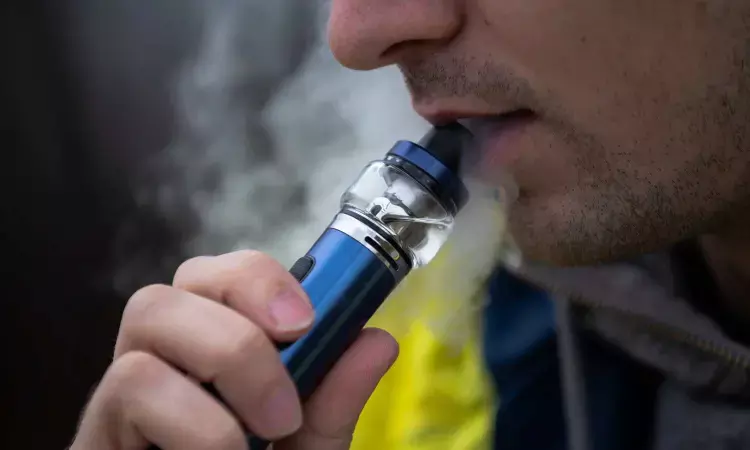- Home
- Medical news & Guidelines
- Anesthesiology
- Cardiology and CTVS
- Critical Care
- Dentistry
- Dermatology
- Diabetes and Endocrinology
- ENT
- Gastroenterology
- Medicine
- Nephrology
- Neurology
- Obstretics-Gynaecology
- Oncology
- Ophthalmology
- Orthopaedics
- Pediatrics-Neonatology
- Psychiatry
- Pulmonology
- Radiology
- Surgery
- Urology
- Laboratory Medicine
- Diet
- Nursing
- Paramedical
- Physiotherapy
- Health news
- Fact Check
- Bone Health Fact Check
- Brain Health Fact Check
- Cancer Related Fact Check
- Child Care Fact Check
- Dental and oral health fact check
- Diabetes and metabolic health fact check
- Diet and Nutrition Fact Check
- Eye and ENT Care Fact Check
- Fitness fact check
- Gut health fact check
- Heart health fact check
- Kidney health fact check
- Medical education fact check
- Men's health fact check
- Respiratory fact check
- Skin and hair care fact check
- Vaccine and Immunization fact check
- Women's health fact check
- AYUSH
- State News
- Andaman and Nicobar Islands
- Andhra Pradesh
- Arunachal Pradesh
- Assam
- Bihar
- Chandigarh
- Chattisgarh
- Dadra and Nagar Haveli
- Daman and Diu
- Delhi
- Goa
- Gujarat
- Haryana
- Himachal Pradesh
- Jammu & Kashmir
- Jharkhand
- Karnataka
- Kerala
- Ladakh
- Lakshadweep
- Madhya Pradesh
- Maharashtra
- Manipur
- Meghalaya
- Mizoram
- Nagaland
- Odisha
- Puducherry
- Punjab
- Rajasthan
- Sikkim
- Tamil Nadu
- Telangana
- Tripura
- Uttar Pradesh
- Uttrakhand
- West Bengal
- Medical Education
- Industry
Electronic nicotine delivery systems linked to earlier onset of asthma in adults: JAMA

USA: A recent study has shed light on a concerning correlation between the use of electronic nicotine delivery systems (ENDS) and the age of asthma onset among both adults and youths in the United States. Published in JAMA Network Open, the research adds to growing concerns about the potential health implications of vaping, particularly concerning respiratory conditions.
This cohort study comprised 7766 adults and 17 023 youths from the Population Assessment of Tobacco and Health Study (2013-2021). It revealed that adults who used ENDS in the past 30 days had an increased risk for asthma incidence at earlier ages versus adults who did not use ENDS in the past 30 days. This finding did not apply to youths.
"These findings suggest the need for tobacco regulations, intervention campaigns, prevention, and cessation programs to prevent early age of asthma onset among adults using ENDS, to protect public health, and to help improve asthma screening guidelines," the researchers wrote.
The association of the use of electronic nicotine delivery systems with the age of asthma onset is unknown. To fill this knowledge gap, Adriana Pérez, The University of Texas Health Science Center at Houston, School of Public Health, Austin, and colleagues explored the association of past 30-day ENDS use with the age of asthma onset in youths and adults who did not have chronic obstructive pulmonary disease (COPD) or asthma and never used cigarettes.
For this purpose, the researchers conducted a secondary analysis of waves 1 to 6 of the US study. Eligible participants included (≥18 years) and youths (12-17 years) who did not have COPD or asthma at the first wave of participation.
The exposure was past 30-day ENDS use at the first wave of participation in the study preceding the asthma onset.
Upper and lower age limits were estimated using the age reported at the first wave of participation and the number of weeks between follow-up waves until asthma was first reported or censored. Weighted interval-censoring Cox regression was used to estimate the association of past 30-day ENDS use with the age of asthma onset. Interval-censoring survival analysis estimated the cumulative hazard function for the age of asthma onset.
The researchers reported the following findings:
- 24, 789 participants were included, with 7766 adults (3305 male [weighted percentage, 40.89%] and 4461 female [weighted percentage, 59.11%]), representing 80.0 million adults, and 17 023 youths (8496 male [weighted percentage 49.32%] and 8514 female [weighted percentage, 50.60%]), representing 33.9 million youths. By age 27, 6.2 per 1000 adults reported asthma incidence (hazard ratio [HR], 0.62%).
- While controlling for covariates, there was a 252% increased risk of the onset of asthma at earlier ages for adults who used ENDS in the past 30 days versus adults who did not (adjusted HR, 3.52).
- For youths, there was no association of ENDS use in the past 30 days with the age of asthma onset (adjusted HR, 1.79), which could be due to a lack of statistical power.
"Modifying screening asthma guidelines to incorporate the P30 ENDS use may lead to early asthma detection leading to better symptom control, fewer adverse effects, lower doses of medication, and improved treatment outcomes," the researchers wrote.
"Cessation and prevention programs directed at ENDS use are needed to alleviate its impact on the age of asthma onset," they concluded.
Reference:
Pérez A, Valencia S, Jani PP, Harrell MB. Use of Electronic Nicotine Delivery Systems and Age of Asthma Onset Among US Adults and Youths. JAMA Netw Open. 2024;7(5):e2410740. doi:10.1001/jamanetworkopen.2024.10740
Dr Kamal Kant Kohli-MBBS, DTCD- a chest specialist with more than 30 years of practice and a flair for writing clinical articles, Dr Kamal Kant Kohli joined Medical Dialogues as a Chief Editor of Medical News. Besides writing articles, as an editor, he proofreads and verifies all the medical content published on Medical Dialogues including those coming from journals, studies,medical conferences,guidelines etc. Email: drkohli@medicaldialogues.in. Contact no. 011-43720751


